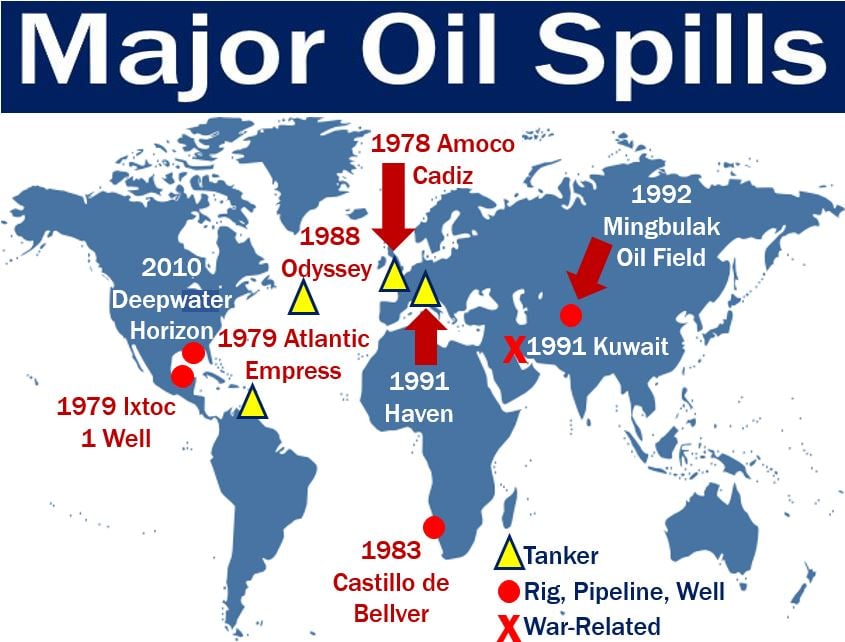An oil spill is an unintentional escape of oil into a body of water, such as the sea. In most cases, the term refers to marine oil spills. However, oil may also spill onto land. When we use the term ‘oil spill’, we are usually referring to a large amount of oil.
The oil may be crude or refined, and consist of several layers. An oil spill is a form of pollution that humans have caused.
The oil spill may have come from a tanker, offshore platform, drilling rig, or well.
There are also refined petroleum product spills. For example, diesel and gasoline (British: petrol) are refined petroleum.
If a heavier fuel that large ships use leaks into the sea, we call it an oil spill too. For example, bunker fuel is a heavy fuel that vessels use. Oil spills may also include waste oil or oily refuse.
Oil spills can have devastating consequences for the environment and wildlife. Society and the economy also suffer.
As a result, oil spills have attracted intense media attention. It is one of the few issues that bring people together. In other words, oil spills are bad, and we all agree on that.

Oil spill history – the worst spills
Kuwait 1991
The largest oil spill ever, occurred on 19th January 1991, during the Gulf War. Iraqi forces, under President Saddam Hussein’s orders, deliberately opened oil valves.
They did this to slow down the American troops as they advanced.
Approximately 330 million gallons of oil spilled into the sea. A 4-inch-thick oil slick covered more than 4,000 square kilometers.
Deepwater Horizon 2010
The Deepwater Horizon Oil Spill started on 20th April 2010 in the Gulf of Mexico. There was a blowout on the Macondo Prospect, an Exclusive Economic Zone off the coast of Louisiana. Specifically, a drilling rig exploded.
Eleven people died in the explosion. According to the US Government, approximately 4.9 million barrels of crude oil subsequently spilled into the sea.
It was the biggest oil spill in US history. Oil continued leaking until 19th September 2010. In other words, oil escaped into the sea for six months. BP had to pay more than $20 billion in fines.
Ixtoc 1 – 1979
In the Bay of Campeche in Mexico, there was an explosion at the Ixtoc 1 oil well. The explosion was due to pressure buildup.
Oil continued leaking into the sea for ten months. In fact, a total of 140 million gallons of crude petroleum spilled into the sea.
The oil spill was huge, covering 1,100 square miles. It devastated the local marine life.
Atlantic Express collision – 1979
The Greek oil tanker, the SS Atlantic Express, collided with the Aegean Captain, another Greek oil tanker. Both the ships were full of crude oil.
The collision occurred in the Caribbean, eighteen miles (29 km) east of Tobago. The Atlantic Express eventually sank.
The collision caused the fifth-largest oil spill ever. It was also the largest spill from a ship.
Oil spill impact
Human impact
Oil spills can have significant negative effects on humans. Above all, an oil spill is a major fire risk.
The fire from the Lac-Mégantic derailment in Canada killed forty-seven people. Also, half the town center was completely destroyed.
Air pollution and respiratory distress can be a serious problem. Young children, elderly people, and individuals with asthma and other respiratory conditions are especially vulnerable.
The Kuwaiti oil fires produced atmospheric pollution that caused respiratory distress.
If there is a blowout, there is an immediate loss of life. This occurred during the Deepwater Horizon explosion.
Oil spills can also contaminate drinking water supplies. In 2013, in Malaysia and Ecuador, two spills contaminated water supplies for 300,000 and 80,000 inhabitants respectively.
An oil spill in Clark County, Kentucky in 2000 contaminated its natural springs.
Impact on fauna and flora
Oil spills also harm nearby wildlife. In fact, it can take several years before animal and plant populations recover.
Oil penetrates into the fur of mammals and the structure of birds’ plumage. This subsequently reduces their insulating ability, which makes them much more vulnerable to temperature changes.
Birds whose feathers are covered in oil can neither fly nor swim properly. The oil makes them much less buoyant in the water.
Oil has a strong smell. This means that animals that rely on their sense of smell to hunt are at risk of starvation. Oil may even blind some animals, leaving them totally defenseless.
As they preen, contaminated birds ingest the oil that coats their feathers. Oil irritates the digestive tract, causes kidney damage. It may also dramatically alter liver function.
Economic impact
According to a US Travel Association estimate, the Deepwater Horizon disaster cost the tourism industry dearly. Approximately $23 billion was lost over a three-month period in the travel industry in the Gulf.
